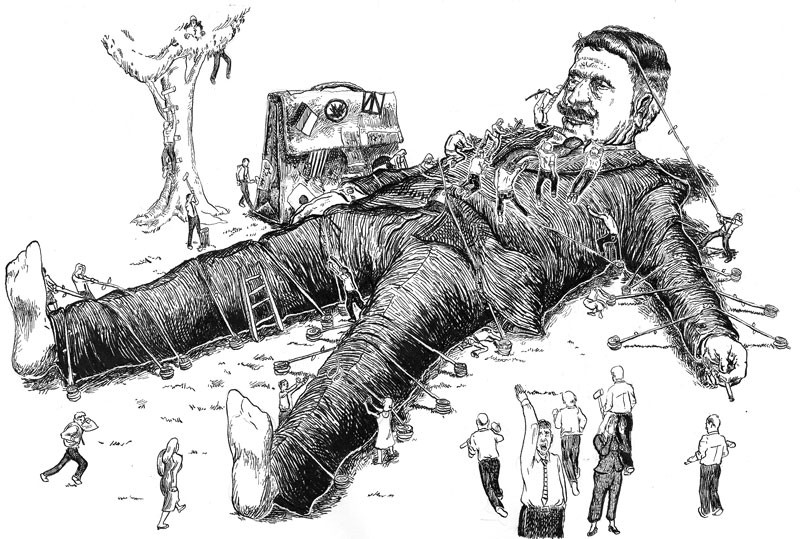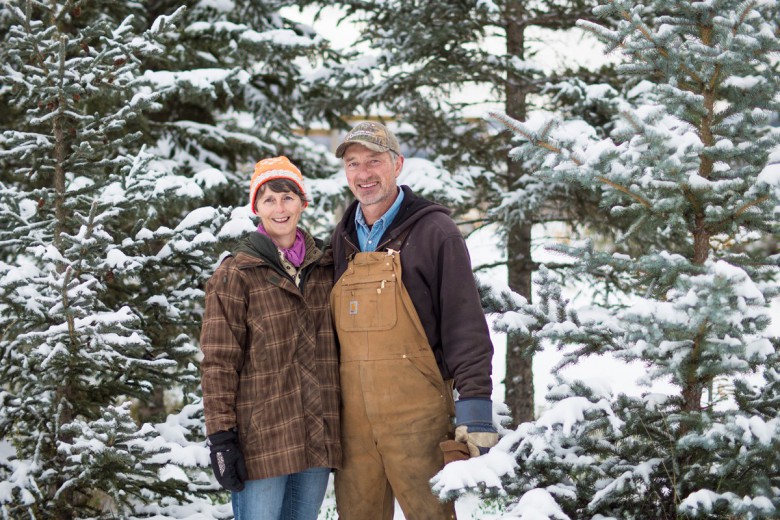
For over a century, we’ve thought of work as the use of human labour and technology to transform natural resources into tradeable goods. This economic model has brought us unparalleled prosperity – and exhausted the planet’s capacity to support us. Building a green economy, Robin Tennant-Wood argues, requires nothing less than a fundamental change in how we understand work and a complete overhaul of the global economy.
If you are the big tree,
we have a small axe.
Sharpened to cut you down,
ready to cut you down.
— Bob Marley
When the global financial system went in to a tailspin in September 2008, western governments, faced with the spectre of collapsing industries and rising unemployment, acted quickly and decisively to secure the manufacturing and construction sectors of the economy. Emergency measures like the auto industry bailout in the U.S., massive injections of cash into the construction sector in Australia and similar support for the manufacturing sector in the U.K. were meant to protect jobs in the face of the potential collapse of these industries.
But massive cash injections can only sustain these industries for so long. Inherent in the concept of sustainability is a recognition that there must be limits to growth if we are to ensure that the present generation does not harm future generations by exhausting available resources. With global supplies of key resources such as oil, copper and steel tightening, we are rapidly approaching these limits, and may soon reach the point when continued expansion of industry becomes not just ecologically perilous but economically impossible.
The global economy has been built on the backs of industries that are neither environmentally nor, in the long run, economically sustainable. We are faced, then, with two unworkable options: allowing these industries and their massive labour forces to disintegrate, precipitating a calamitous increase in unemployment and widespread economic hardship, or continuing to pour vast amounts of public money into an economic model on the brink of collapse. Neither option is tenable, but a third option is emerging that involves rethinking not just the role of work in the economy, but the role of the economy in society.
The nature of work under scrutiny
The place of work in society, especially for the lower classes, has remained largely unchanged since the Industrial Revolution. Technology has dramatically altered many traditional jobs, rendered others obsolete and created new ones, but labour as the primary factor of production has remained unchanged, particularly in industries that rely on a large unskilled or trade-based workforce. These are the jobs that governments rushed to save in late 2008 and early 2009: the jobs of workers dependent upon a production system that uses human labour to transform natural resources into consumer goods. When this system was developed, natural resources were in cheap and plentiful supply. This is no longer the case.
As more people begin to recognize the unsustainability of our economic system, an alternative view of work has been steadily gaining traction. The purpose of work, according to this emerging paradigm, should not be subverted to the demands of a constantly expanding economy – growth for growth’s sake – but should be dedicated to enriching the social fabric, natural ecosystems and public infrastructure that sustain us.
Contemporary British philosopher Alain de Botton notes in The Pleasures and Sorrows of Work that we have become completely distanced from the labour that goes into the things we use in our everyday lives, including our food. There is no acknowledgment of the Kenyan woman who picked the tea, the Philippine pieceworker who sewed the jeans, the Korean factory worker who spray-painted the car, the Egyptian farmer who grew the oranges or the Chinese teenager who assembled the plush animal that wears your football team’s jersey. Unrecognized, too, are the hundreds of pairs of hands that the goods pass through between origin and destination: forklift and truck drivers, commercial shipping and wharf labourers, baristas and retail clerks are all providing the labour that creates global capital.
This chasm between the production and consumption of almost everything we use is being challenged by a growing movement to source goods and services locally. This drive to localize helps foster a grassroots system of production-consumption-production that reconnects people with the processes that sustain them, puts minimum pressure on resources and reduces the ecological footprints of urban areas. It also is fueling the emergence of a new “green-collar” labour market consisting of jobs that are socially and environmentally useful and that contribute to a sustainable economy, rather than one based solely on the creation of wealth.
From blue-collar to green-collar
Green jobs focus on sectors such as renewable energy, food production, transportation and recycling and waste minimization, seeking to build healthier social and environmental systems rather than simply to promote economic growth. Retrofitting old buildings instead of demolishing them to make way for new ones, creating urban food forests, organizing the office carpool and bike fleet, or designing wildlife and biodiversity corridors in cities are jobs that didn’t exist 25 years ago. Now, they are part of a transformation in our understanding of labour and how it can contribute to sustainability.
Van Jones is the author of The Green Collar Economy, and served recently as special adviser to the White House on green jobs. He is also the co-founder of Green for All, a U.S. organization that works “to build an inclusive green economy strong enough to lift people out of poverty.” Jones sees a green-collar workforce as the “upgrading” of blue-collar employment to “better respect the environment: family-supporting, career-track, vocational or trade-level employment in environmentally friendly fields.”
Green-collar jobs encompass a wide range of skill sets. The Australian Conservation Foundation and Australian Council of Trade Unions recently released a paper promoting green jobs. It included blue-collar areas of work, but also upgraded white-collar jobs such as procurement or purchasing officers, office managers and education officers. Far from the bucolic ideals of the back-to-the-land movement, these jobs are fully enmeshed in the urban, tech-savvy, 21st-century economy. If one thing unites them, it’s that they contribute to the economy not by exploiting natural resources, but by pursuing initiatives that conserve or rehabilitate natural resources.
Most local governments in Australia are already creating green-collar positions. As recently as five years ago, local governments saw environmental services as primarily concerned with regulatory aspects of planning and development. Increasingly these jobs are being geared towards educating and engaging the community.
Debra Bell is the sustainability officer for the city council of Queanbeyan, a city of 37,000 in southern New South Wales. One of Bell’s biggest recent successes was a two-day sustainability expo organized in response to community requests for information.
Does Bell see a future for “greened-up” white-collar jobs in local government? “Absolutely. This area is growing all the time. It would be great to see all [local government] positions sustainability-based and community-driven.”
Working out of the same office as Bell is Geoff Pryor, project coordinator for the South East Resource Recovery Regional Organisation of Councils (SERRROC). Pryor facilitates a co-operative venture to sustainably manage waste across a region consisting of 12 rural and regional councils that represent a population of around 170,000. The project is based on the premise that small local governments do not have the clout or resources required to reduce and divert waste cost-effectively. As a co-operative, the 12 councils share resources and programming and work with industry on measures to reduce waste. Pryor is optimistic that SERRROC can even have some influence on federal government policy regarding electronic waste, in particular.
From a national policy perspective, if green jobs are worth creating when the economy is good, why, when the economy goes bad, are national governments so fixated on protecting jobs in old resource-extraction and polluting industries? The green employment sector at the local government level is growing rapidly, but at the national and international level, governments continue to undervalue the environment as a resource in its own right and pour money into protecting jobs almost exclusively within industries that are contributing to serious environmental problems. Diverting that investment into retraining and education for displaced workers or creating jobs in areas such as renewable energy, information and communications technology, plantation timber production or recycling and resource management would have a far more positive long-term effect.
Looking to the grassroots
Rather than taking a linear view of labour as part of the conveyor belt that transforms natural resources and human labour into consumer products, the emerging view of green and local economies sees labour as cyclical: part of a system that directly addresses social needs from source to sale to disposal, building community in the process. Sustainable labour systems should be based on the same sort of cyclical processes that govern natural systems: complementary, overlapping, mutually beneficial processes. In much the same way as we are coming to see one sector’s waste as another sector’s valuable resource, labour in one field complements a need in another. In a grassroots sense, this view of labour is personal, direct and empowering: no job is without value.
Holistic approaches to work and the economy can take many forms. The mantra of the early green movement, “Think globally, act locally,” is reflected in the rise in popularity of such initiatives as Local Exchange Trading Schemes (LETS), farmers’ markets, co-housing initiatives and power generation co-operatives. Within these operations, work is co-operatively managed to ensure that each participant is part of a process in which their contribution is visible and valued by all others in the system. In the case of LETS, for example, goods or services are traded directly rather than for money. Replacing the flow of capital with the direct provision of goods and services creates a sense of shared responsibility among traders, building both social capital and local economies.
The local food movement in particular has been gaining ground in recent years. Farmers’ markets are growing in size and number as city dwellers turn their backs on imported and processed foods and look for locally grown, fresh, seasonal produce. The biggest such market in Australia is held each Saturday morning in the national capital, Canberra, where up to 5,000 people buy fresh fruit and vegetables, wines and oils, bread, dairy produce, meats, patisserie and plants directly from more than 100 growers and producers. After only five years in operation, the demand for direct purchasing of food in Canberra has been so great that a second, Sunday-morning market has been established and is flourishing on the opposite side of town.
One of the Canberra market founders, Dave Pentony, has seen a huge shift in the way people are thinking about their food purchases. Pentony and his family have a small farm on the outskirts of Canberra and sell organically grown salad greens at the markets on Saturdays and Sundays. Pentony has also opened a direct outlet for local growers in a suburban shopping centre. Based on the Japanese tradition of farmers selling directly to consumers, his store, Choku Bai Jo, which translates as direct selling place, has created five jobs in retail and provides a point of sale for up to 20 local urban, peri-urban and rural growers.
In Europe, power co-operatives have provided local communities with access to power from renewable energy, particularly wind power, through co-operative ownership of the infrastructure. On the Scottish Isle of Gigha, for instance, three wind turbines generate about two-thirds of the local community’s power. The net profit of the venture goes into improving the energy efficiency of the local housing stock, which is owned and operated by the Gigha Heritage Trust, itself a co-operative arrangement that gave ownership of the once privately owned island to its residents. The upgrading of the housing stock is creating local employment in a small community where unemployment and poverty are common.
Taking control of work
At a time of upheaval in the traditional labour and capital markets, there is surprising resiliency in local economies, where individuals have relatively more control over their economic well-being rather than being locked into a linear and hierarchical labour system. Within the traditional capitalist labour hierarchy, each participant in the workforce is dependent upon the level above for decisions and the level below for implementation. The higher the level, the more abstract the decisions and the greater the distance from their implementation and consequences. Each worker has less autonomy to direct their energies to responding to the needs of their community or the environment.
Workers in a local economy, on the other hand, can better assess what they need to get from their job, their contribution to their community, the needs of those around them, the wider social or environmental benefits of their job and its long-term impacts and consequences. This greater responsiveness helps to ensure that each participant in the local economy is able to meet his or her own needs while contributing to the common good.
The green economy is gradually emerging as a true alternative, but real change is coming much more slowly than the urgency of our situation demands. For substantive change to really take hold, governments must recognize that socially useful and environmentally sound work will also be economically viable, and invest and regulate accordingly. Local communities and local governments are already beginning to do so.
If the global financial crisis has taught us anything, it should be that, to paraphrase Einstein, problems can’t be solved by using the same kind of thinking that created them. The nature of work and how we organize it must be in accord with the nature of the society we wish to build. The hardship that accompanies economic recession can be greatly reduced through creative investments in green labour and local economic initiatives.
For more information, please see “Resources to fuel the shift to a green economy.”






